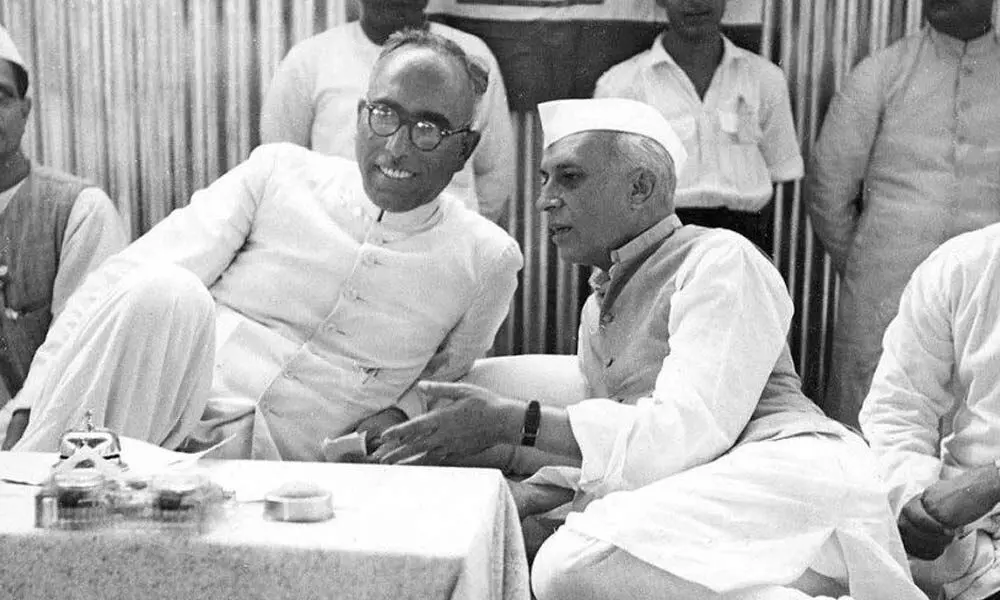Sheikh Abdullah's Kashmiri nationalism

Sheikh Abdullah’s Kashmiri nationalism
Sheikh Mohammad Abdullah a teacher by profession, from Aligarh Muslim University with master’s in chemistry plunged into politics to fight for the basic political and economic rights of his people.
Sheikh Mohammad Abdullah a teacher by profession, from Aligarh Muslim University with master's in chemistry plunged into politics to fight for the basic political and economic rights of his people. His foray into active politics was stirred by an incident of blasphemy of the Holy Quran in Jammu. Sheikh made a fiery speech before 30,000 people condemning the blasphemous act; he "reminded the Muslims (of Kashmir) of their slavery and called upon them to fight for their birthright." The speech made him an instant hero and since then the modern history of Kashmir and Sheikh's political decisions are intertwined.
According to Historian Ramachandra Guha, Mahatma Gandhi once said, "Sheikh Abdullah had done one great thing. He had kept the Hindus, Sikhs and Muslims united in Kashmir and created a situation in which they would wish to live and die together."
According to Professor Noor Ahmed Baba, "Abdullah was instrumental in transforming the Muslim Conference into the National Conference to open it to all sections of society and make it more inclusive. "Abdullah was very devoted to well-being of all Kashmiris,"
Constitutional scholar AG Noorani said, "Sheikh Abdullah's Kashmiri nationalism clashed with Pandit Jawaharlal Nehru's Indian nationalism. It was this very clash which led to his imprisonment in 1953 for 11 years on the charge of plotting accession to Pakistan and waging war against India."
Jinnah was against Sheikh getting closer to the INC and its leaders. In April 1939, two months before the dissolution of the Muslim Conference, Jinnah told Kashmiri students at the Aligarh Muslim University: "I can say with certainty (Sheikh Mohammad Abdullah) is in the wrong. Having got himself ensnared by the Congress, which is thoroughly a Hindu organisation, he has put the ship of his community in a whirlpool."
Sheikh started arguing that "struggle for their rights was not a fight between Hindus and Muslims but between the oppressor and oppressed; between rich and the poor." He wanted to dismantle Muslim Conference to make a new organisation look more nationalistic. Incidentally, Sheikh's wife Begum Akbar Jehan tried to persuade her husband not to disband Muslim Conference. She even left her parent's house and returned only fearing getting divorced.
Even this dissolution didn't impress Kashmiri pandits and they didn't join Sheikh's National Conference and if few of them who joined him, left him soon. However, Nehru after the dissolution of the Muslim Conference remained all along with Sheikh and visited him in Srinagar along with Khan Abdul Gaffar Khan in May 1940.
In 1968, after spending long time in jail, Sheikh Abdullah at a reception in New Delhi said: "The Quaid-e-Azam had told me that I am like your father. Look at my grey hair. It has not greyed under the sunshine. I have spent my entire life in politics. Initially, I had joined the very Hindu leaders and dreamt of united India but was forced to part ways. Remember! If you don't listen to my advice you will repent one day." It is said that Sheikh Abdullah was opposed to the assurance given by India at the UNO for a plebiscite in J&K. He was of the view that after the formation of the Constituent Assembly of J&K to ratify accession, there was no need for plebiscite.
- Part-II, Sher-e-Kashmir










